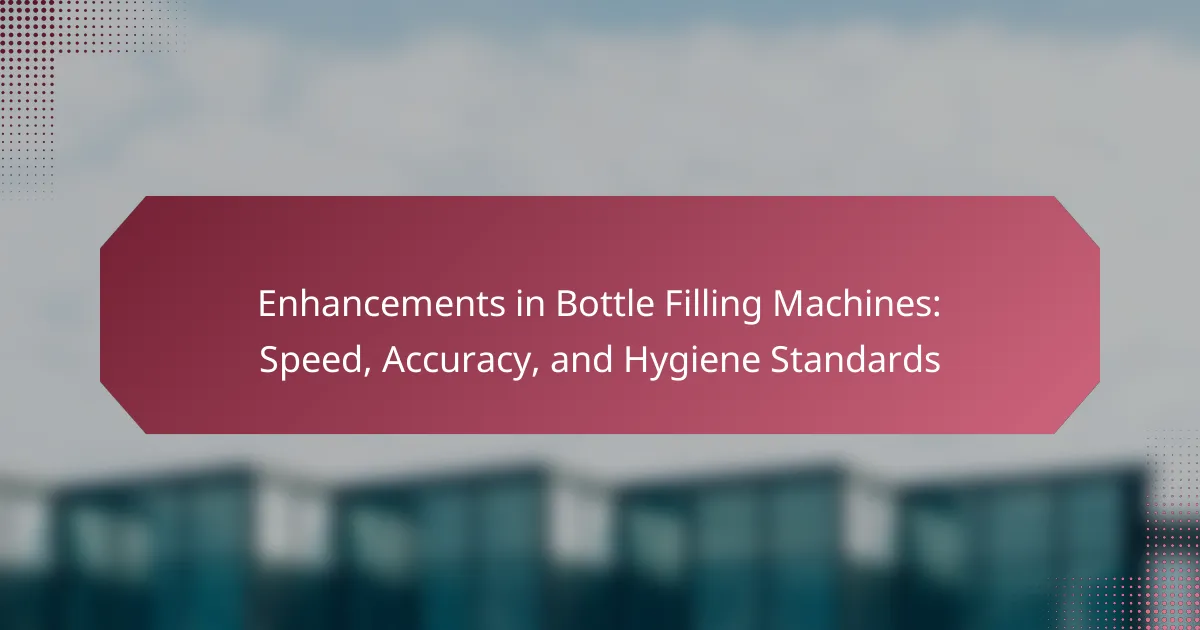Modular brewing systems are innovative setups designed for the efficient production of beer, characterized by interconnected modules that can be added or removed based on production requirements. These systems enhance scalability, allowing breweries to incrementally expand their capacity while minimizing upfront investments and operational costs. Key components such as mash tuns, fermenters, and storage tanks can be customized to adapt to various brewing styles and market demands. The flexibility of modular systems facilitates easy upgrades and maintenance, ultimately leading to increased efficiency and faster returns on investment for breweries.

What are Modular Brewing Systems?
Modular brewing systems are flexible, scalable brewing setups that allow for the efficient production of beer. These systems consist of interconnected modules that can be easily added or removed based on production needs. Each module typically includes essential components like mash tuns, fermenters, and storage tanks. This design allows breweries to adapt to changing market demands without significant infrastructure changes. Modular systems can reduce initial capital investment by allowing incremental expansion. They also facilitate easier maintenance and upgrades, enhancing overall operational efficiency. The ability to customize configurations further supports diverse brewing styles and recipes.
How do Modular Brewing Systems differ from traditional brewing setups?
Modular brewing systems differ from traditional brewing setups primarily in their design and scalability. Traditional brewing setups often consist of fixed, large-scale equipment that requires significant space and investment. In contrast, modular systems are designed to be flexible and can be easily expanded or reconfigured. This allows brewers to scale production based on demand without the need for extensive renovations.
Additionally, modular systems often have a lower initial cost compared to traditional setups. They can be installed incrementally, allowing for a gradual investment in equipment. This flexibility enables brewers to adapt to changing market conditions more efficiently.
Furthermore, modular brewing systems generally offer improved efficiency. They can integrate advanced technology, allowing for better control over the brewing process. This leads to higher quality and consistency in the final product. Overall, the differences lie in design, cost, scalability, and operational efficiency.
What are the key components of Modular Brewing Systems?
The key components of Modular Brewing Systems include brewing vessels, fermentation tanks, and control systems. Brewing vessels are essential for mashing and boiling ingredients. Fermentation tanks allow for the fermentation process to occur under controlled conditions. Control systems manage temperature, pressure, and timing throughout the brewing process. Additional components often include pumps, piping, and heat exchangers to facilitate movement and temperature regulation of liquids. Each component is designed to be easily integrated or scaled, enhancing flexibility and efficiency in brewing operations.
What technologies are commonly used in Modular Brewing Systems?
Modular brewing systems commonly use technologies such as automated brewing controls, modular fermentation tanks, and heat exchangers. Automated brewing controls enhance precision and efficiency in the brewing process. Modular fermentation tanks allow for flexible scaling and easy configuration. Heat exchangers improve energy efficiency during the brewing and cooling phases. Additionally, some systems incorporate IoT technology for remote monitoring and control. These technologies collectively enable breweries to adapt quickly to market demands while maintaining quality and consistency.
Why are Modular Brewing Systems gaining popularity?
Modular brewing systems are gaining popularity due to their scalability and flexibility. These systems allow breweries to easily expand production capacity as demand increases. This adaptability is crucial in a rapidly changing market. Additionally, modular systems require less upfront investment compared to traditional brewing setups. This cost-effectiveness appeals to both new and established breweries. Many breweries can start with a smaller system and gradually add modules. This approach minimizes financial risk while maximizing production potential. Recent industry surveys indicate that breweries using modular systems report higher efficiency and lower operational costs.
What trends in the brewing industry support the adoption of Modular Brewing Systems?
The brewing industry is experiencing several trends that support the adoption of Modular Brewing Systems. Increased demand for craft beers drives breweries to scale operations efficiently. Modular systems allow for rapid expansion without significant capital investment. The trend towards sustainability influences breweries to adopt energy-efficient modular solutions. Customization of beer flavors is also on the rise, and modular systems provide flexibility for small batch production. Additionally, the rise of home brewing has popularized smaller systems that can be easily integrated into existing setups. According to a report by the Brewers Association, craft beer sales increased by 21% from 2019 to 2020, highlighting the need for scalable solutions. These trends collectively indicate a strong market alignment with modular brewing systems.
How do consumer preferences influence the demand for Modular Brewing Systems?
Consumer preferences significantly influence the demand for Modular Brewing Systems. As consumers increasingly seek craft beer with unique flavors, modular systems allow breweries to experiment easily. These systems offer scalability, enabling smaller breweries to expand production without large upfront investments. Flexibility in design and operation aligns with consumer trends for customization and variety. Studies indicate that 70% of consumers prefer brands that offer innovative products. This drives breweries to adopt modular systems to meet evolving tastes. Additionally, the demand for sustainable practices makes modular systems appealing due to their efficient resource use. Hence, consumer preferences for quality, variety, and sustainability directly boost the demand for Modular Brewing Systems.

What are the Scalability Benefits of Modular Brewing Systems?
Modular brewing systems offer significant scalability benefits. They allow breweries to expand production capacity incrementally. This means that brewers can add new modules as demand increases. Each module can operate independently, facilitating easy upgrades. Additionally, modular systems reduce the need for extensive renovations. This flexibility supports various batch sizes and styles. According to a study by the Brewers Association, modular systems can increase efficiency by up to 30%. This efficiency leads to faster return on investment for expanding breweries.
How can Modular Brewing Systems scale production effectively?
Modular brewing systems can scale production effectively by allowing breweries to add capacity incrementally. This flexibility means that breweries can expand their operations without significant upfront investment. Each module can operate independently or in conjunction with others, optimizing workflow and efficiency.
Research indicates that modular systems can reduce downtime during upgrades or expansions. For example, a brewery can install additional fermentation tanks while continuing to operate existing ones. This approach minimizes disruption to production schedules.
Additionally, modular systems are designed for easy integration with existing infrastructure. This compatibility enables breweries to adapt to changing market demands quickly. By responding to consumer preferences, breweries can increase production of popular products without overcommitting resources.
Overall, the scalability of modular brewing systems supports growth while maintaining operational efficiency.
What factors contribute to the scalability of Modular Brewing Systems?
The scalability of Modular Brewing Systems is primarily influenced by their design flexibility and modular components. Modular systems allow brewers to add or remove equipment based on production needs. This adaptability enables breweries to efficiently respond to market demands. Additionally, the standardized components simplify maintenance and upgrades. The use of pre-fabricated modules reduces installation time and costs. Furthermore, modular systems often have a smaller footprint, allowing for easier expansion in limited spaces. This scalability is supported by successful case studies, such as breweries that have increased production capacity without significant infrastructure changes.
How does scalability affect profitability in brewing operations?
Scalability directly impacts profitability in brewing operations by allowing businesses to increase production without proportionally increasing costs. As breweries scale, they can achieve economies of scale. This results in lower costs per unit of production. For instance, larger operations can negotiate better prices for raw materials due to bulk purchasing. Additionally, scaling enables breweries to spread fixed costs over a larger output. This increases overall margins. According to a study by the Brewers Association, breweries that effectively scale can increase their profit margins by up to 20%. Thus, scalability is crucial for enhancing profitability in brewing operations.
What challenges are associated with scaling Modular Brewing Systems?
Scaling Modular Brewing Systems presents several challenges. One major challenge is the integration of additional modules with existing systems. This can lead to compatibility issues, requiring careful planning and design. Another challenge is maintaining consistent quality across different batches produced in scaled systems. Variability in equipment performance can affect the final product. Additionally, there may be limitations in space and infrastructure that hinder expansion. The need for skilled labor to operate and manage larger systems can also pose a significant hurdle. Financial constraints may arise when investing in new modules and technology. Overall, these challenges must be addressed to successfully scale Modular Brewing Systems.
What strategies can mitigate scalability challenges?
Implementing modular brewing systems can effectively mitigate scalability challenges. These systems allow for incremental capacity increases without major overhauls. By adding new modules, breweries can expand production as demand grows. This approach minimizes downtime and reduces initial capital investment. Additionally, modular systems offer flexibility in production processes. Breweries can adapt to changing market trends quickly. Historical data shows that modular systems can increase production efficiency by up to 30%. This efficiency translates to cost savings and improved profit margins. Overall, modular brewing systems provide a strategic solution for scalability challenges.
How can brewers assess their scalability needs?
Brewers can assess their scalability needs by evaluating their current production capacity and future demand. They should analyze historical sales data to identify growth trends. Conducting market research helps understand potential increases in customer base. Brewers must also consider equipment capabilities and limitations. Reviewing operational efficiency can reveal bottlenecks in the brewing process. Financial projections are essential for understanding investment requirements. Additionally, engaging with industry benchmarks can provide insights into competitive scalability standards. These assessments enable brewers to make informed decisions about expanding their operations effectively.

How do Modular Brewing Systems offer Flexibility?
Modular brewing systems offer flexibility by allowing brewers to customize their setups according to specific needs. These systems can be easily expanded or reconfigured as production demands change. Each module can operate independently, enabling brewers to scale operations without significant downtime. This adaptability supports various brewing styles and batch sizes. Additionally, modular systems can be integrated with existing equipment, providing seamless upgrades. The ability to switch components enhances operational efficiency. Such flexibility is crucial for responding to market trends and consumer preferences.
What flexible configurations are available in Modular Brewing Systems?
Modular Brewing Systems offer various flexible configurations tailored to different brewing needs. These configurations can include scalable unit sizes, allowing for adjustments based on production demands. Systems can be customized with interchangeable components, such as fermenters and boilers. This enables brewers to modify their setup without significant downtime. Additionally, modular designs facilitate easy expansion, accommodating future growth. Integration with automation technology is also common, enhancing operational efficiency. The versatility of these configurations supports diverse brewing styles and recipes. This adaptability is crucial for breweries aiming to optimize production and respond to market changes effectively.
How does flexibility benefit different brewing styles?
Flexibility benefits different brewing styles by allowing brewers to adapt processes and ingredients easily. This adaptability leads to experimentation with flavors and techniques. For instance, modular brewing systems enable quick adjustments to batch sizes. Brewers can switch between styles like lagers and IPAs without extensive downtime. This capability enhances creativity and innovation in brewing. According to a study by the Brewers Association, 70% of craft brewers emphasize flexibility as key to their success. Flexibility also supports seasonal and market-driven changes in production. This responsiveness can increase customer satisfaction and sales.
What role does modularity play in adapting to market changes?
Modularity enables brewing systems to quickly adjust to market changes. It allows for the easy addition or removal of components. This flexibility is crucial when responding to fluctuating consumer demands. For instance, breweries can scale production up or down without significant downtime. Modular systems can also accommodate new technologies or recipes efficiently. This adaptability helps businesses remain competitive in dynamic markets. As a result, breweries can optimize their operations and resource allocation. The ability to modify systems aligns production with market trends effectively.
How does flexibility impact operational efficiency?
Flexibility enhances operational efficiency by allowing organizations to adapt quickly to changing demands. It enables businesses to modify processes, resources, and workflows as needed. This adaptability reduces downtime and improves productivity. For example, modular brewing systems can be adjusted in capacity or configuration based on market trends. Studies indicate that companies with flexible operations experience a 20% increase in efficiency. This increase is linked to reduced waste and optimized resource allocation. Flexibility also fosters innovation, leading to improved product offerings. Overall, flexibility is crucial for maintaining high operational efficiency in dynamic environments.
What are the cost implications of flexible brewing setups?
Flexible brewing setups can significantly reduce initial capital expenditures. These systems allow brewers to start with a smaller investment and expand as demand grows. This scalability minimizes financial risk, especially for new entrants in the brewing industry.
Additionally, flexible brewing setups often lead to lower operational costs. They can optimize resource usage, such as energy and raw materials, thus decreasing overall expenses. For example, modular systems allow for efficient batch sizes tailored to current demand, reducing waste.
Moreover, maintenance costs can be lower due to the simplicity of modular components. This can lead to less downtime and higher productivity. Studies show that breweries utilizing flexible setups can achieve a return on investment faster compared to traditional systems.
In summary, the cost implications of flexible brewing setups include reduced initial investment, lower operational costs, and quicker returns, making them an economically viable choice for brewers.
How can brewers optimize flexibility to meet demand?
Brewers can optimize flexibility to meet demand by implementing modular brewing systems. These systems allow for quick adjustments in production capacity. By utilizing interchangeable components, brewers can easily scale operations up or down. This adaptability helps respond to market fluctuations efficiently. Additionally, modular systems facilitate experimentation with new recipes without significant downtime. Research shows that breweries using modular systems report increased responsiveness to consumer trends. This approach enhances overall operational efficiency and reduces waste.

What makes Modular Brewing Systems Cost-Effective?
Modular Brewing Systems are cost-effective due to their scalability and reduced operational costs. They allow breweries to start small and expand as demand grows. This flexibility minimizes upfront investment and financial risk. Modular systems often require less space and lower utility costs. They can be tailored to specific production needs, avoiding unnecessary expenses. Additionally, these systems often feature energy-efficient designs that reduce energy consumption. The ability to integrate new technology easily further enhances cost savings over time. Overall, the combination of these factors leads to significant long-term financial benefits for breweries.
How do Modular Brewing Systems reduce initial investment costs?
Modular Brewing Systems reduce initial investment costs by allowing breweries to start with smaller, scalable setups. This approach minimizes upfront capital requirements compared to traditional brewing systems. Breweries can expand their operations gradually as demand increases. Each module can be added incrementally, reducing financial risk. Additionally, modular systems often require less space and infrastructure investment. This further decreases initial costs associated with facility modifications. Research indicates that businesses using modular systems see a quicker return on investment. The flexibility of these systems contributes to overall cost savings in the long run.
What are the long-term savings associated with Modular Brewing Systems?
Modular Brewing Systems provide significant long-term savings through reduced operational costs and increased efficiency. These systems are designed to be energy-efficient, minimizing utility expenses. They also require less maintenance compared to traditional brewing setups, leading to lower repair costs over time. The scalability of modular systems allows breweries to expand production without substantial new investments, optimizing capital expenditure. Additionally, the ability to automate processes reduces labor costs, further enhancing savings. A study by the Brewers Association indicates that breweries using modular systems can reduce their overall operating costs by up to 30% over five years.
How do operational costs compare between Modular and traditional systems?
Modular systems generally have lower operational costs compared to traditional systems. Modular systems allow for scalability, enabling breweries to expand capacity without significant upfront investment. This flexibility reduces the need for extensive infrastructure changes. Traditional systems often require larger initial capital and higher maintenance costs. According to a study by the Brewers Association, modular systems can reduce energy consumption by up to 30%. This lower energy usage contributes to overall cost savings. Additionally, modular systems often have shorter installation times, leading to quicker returns on investment.
What financial benefits can brewers expect from Modular Brewing Systems?
Brewers can expect significant financial benefits from Modular Brewing Systems. These systems reduce initial capital investment due to their scalable design. Brewers can start with smaller setups and expand as demand increases. This flexibility minimizes financial risk associated with overproduction. Modular systems also lower operational costs through efficient resource use. They streamline processes, reducing labor and energy expenses. Additionally, these systems often allow for faster production cycles. This leads to quicker returns on investment. Overall, Modular Brewing Systems enhance profitability through cost savings and increased production capacity.
How does cost-effectiveness influence brewers’ decision-making?
Cost-effectiveness significantly influences brewers’ decision-making by guiding their investment choices. Brewers evaluate the financial implications of equipment and operational costs. They seek systems that maximize production while minimizing expenses. Modular brewing systems are particularly appealing due to their scalable nature. This scalability allows brewers to adjust production levels without incurring excessive costs. Additionally, lower initial investments in modular systems can lead to quicker returns. Studies show that cost-effective practices can enhance profit margins by up to 30%. Therefore, brewers prioritize cost-effectiveness to ensure sustainable growth and competitiveness in the market.
What metrics should brewers use to evaluate cost-effectiveness?
Brewers should use metrics such as production cost per barrel, labor cost per barrel, and raw material cost per batch to evaluate cost-effectiveness. Production cost per barrel measures the overall expenses associated with brewing each barrel of beer. Labor cost per barrel assesses the efficiency of workforce utilization in relation to production output. Raw material cost per batch evaluates the expenses incurred for ingredients used in brewing. These metrics provide a comprehensive view of financial performance. They help brewers identify areas for improvement and optimize resource allocation. Tracking these metrics can lead to increased profitability and sustainability in brewing operations.
What are best practices for maximizing the benefits of Modular Brewing Systems?
To maximize the benefits of Modular Brewing Systems, implement a flexible design that allows for easy scalability. This design supports adjustments in production capacity based on demand fluctuations. Regular maintenance is crucial to ensure optimal performance and longevity of the system components. Staff training enhances operational efficiency and reduces the risk of errors during brewing processes. Utilize automation technology to streamline workflows and minimize manual intervention. Incorporate data analytics to monitor production metrics and identify areas for improvement. Additionally, source high-quality ingredients to enhance the final product quality. These practices collectively contribute to improved efficiency and cost-effectiveness in brewing operations.
Modular Brewing Systems are innovative setups designed for efficient beer production, characterized by their flexibility, scalability, and cost-effectiveness. This article explores the advantages of these systems, including their ability to adapt to changing market demands, lower initial investment costs, and enhanced operational efficiency. Key components such as brewing vessels, fermentation tanks, and advanced technologies are discussed, alongside trends in the brewing industry that support their adoption. Additionally, the article examines how consumer preferences and scalability impact profitability, as well as best practices for maximizing the benefits of modular brewing systems.



